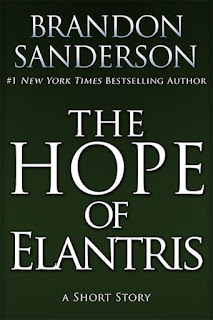Arcanum Unbounded
is a 2017 collection from Brandon Sanderson collecting all of the short fiction
that had been written and published for the Cosmere to that point. This means there are short stories, novellas,
and novelettes featured, all generally longer than one may expect from a
typical piece of short fiction. As such I
have decided to split the review for the collection into four separate reviews,
generally splitting up by systems, three connected to previously released
series and one covering the miscellaneous pieces of standalone short
fiction. This first covers ‘The Selish
System’ section of the collection, containing the novella The Emperor’s Soul
and the short story “The Hope of Elantris.”
The Emperor’s Soul is
one of those Sanderson stories that you hear quite a lot about. It was originally published in 2012 by
Tachyon Publications and has its reputation among Sanderson’s best as it won
the Hugo Award for Best Novella in 2013.
Needless to say as this was the first time reading any of the works in
this collection, I had some prior expectations that it would at least be very good. This novella follows a format that I wasn’t
quite expecting, acting as one of Sanderson’s more spiritual works asking
questions about what it might mean to have one’s life reconstructed by magic. The Emperor Ashravan has been left comatose due
to an assassination attempt upon him and his wife, who sadly perished, but this
sad circumstance buys the court 100 days to find a solution. The solution they come to is to conscript
Shai, a woman who was condemned after stealing the emperor’s scepter, to delve
into the Emperor’s life and reconstruct his mind using her skills as a
Forger. This is a story that is quite
simple, it clocks in at just under 200 pages in its original format, about 130
in Arcanum Unbounded, but honestly it’s the simplicity that makes it
work. Shai is our main point of view
character and Sanderson explores her relationship to Forging, something that she
regards as an art but in larger society it is detested. Part of the fear is that the Emperor’s soul
cannot be changed, but a simple copy of the soul wouldn’t be enough for Shai
and her art. The task seems impossible
which is perfect for the stakes and as the clock ticks down, the narrative skipping
several days as research progresses and the Forging begins, the tension
increases. The conclusion heavily
implies that Shai’s influence changes who the Emperor has become, bringing suppressed
memories and genuinely breathing new life.
Sanderson doesn’t quite delve into the harsher implications with this,
but The Emperor’s Soul is brilliant at exploring the nature of art and
how society often overlooks art that doesn’t fit into the confines of a certain
dominant worldview which is refreshing.
As a novella, you can see why it won the Hugo Award in 2013, although there
are places that are itching to be expanded upon in a way that a sequel wouldn’t
necessarily be able to accomplish. 8/10.
“The Hope of Elantris” is an honest to goodness short
story from Brandon Sanderson and is an example of some of his earlier
work. It was originally published in
2006 as an Amazon exclusive ebook. Since
this is a relatively early work it’s heavily connected to Elantris, his first
novel, mainly because that was the only book he had published at this point and
the way the story came about because Sanderson’s wife, Emily, had a student who
excelled at a book report on Elantris not knowing that her teacher was
dating the author. Sanderson didn’t even
really have the idea for the story and you can kind of tell. It’s a very quickly paced story set during
the climax of Elantris, though with a new characer, Matisse, who looks
after children in Elantris. She’s a fun
character and this is a story of her building courage and standing her ground
in the face of danger and honestly that’s about it. It’s not very deep, and you can tell that it’s
an early work for Sanderson as it feels more like a couple of chapters taken
out of Elantris for good reason (they’d stop the narrative dead introducing
new characters). Obviously, that wasn’t
the case but as it is it’s a fine enough read. 6/10.


No comments:
Post a Comment